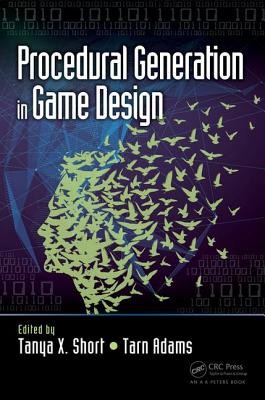
- We will send in 10–14 business days.
- Publisher: A K PETERS
- ISBN-10: 1498799191
- ISBN-13: 9781498799195
- Format: 15.5 x 23.1 x 2 cm, minkšti viršeliai
- Language: English
- SAVE -10% with code: EXTRA
Procedural Generation in Game Design (e-book) (used book) | bookbook.eu
Reviews
Description
Making a game can be an intensive process, and if not planned accurately can easily run over budget. The use of procedural generation in game design can help with the intricate and multifarious aspects of game development; thus facilitating cost reduction. This form of development enables games to create their play areas, objects and stories based on a set of rules, rather than relying on the developer to handcraft each element individually. Readers will learn to create randomized maps, weave accidental plotlines, and manage complex systems that are prone to unpredictable behavior. Tanya Short's and Tarn Adams' Procedural Generation in Game Design offers a wide collection of chapters from various experts that cover the implementation and enactment of procedural generation in games. Designers from a variety of studios provide concrete examples from their games to illustrate the many facets of this emerging sub-discipline.
Key Features:
- Introduces the differences between static/traditional game design and procedural game design
- Demonstrates how to solve or avoid common problems with procedural game design in a variety of concrete ways
- Includes industry leaders' experiences and lessons from award-winning games
- World's finest guide for how to begin thinking about procedural design
EXTRA 10 % discount with code: EXTRA
The promotion ends in 21d.20:17:31
The discount code is valid when purchasing from 10 €. Discounts do not stack.
- Publisher: A K PETERS
- ISBN-10: 1498799191
- ISBN-13: 9781498799195
- Format: 15.5 x 23.1 x 2 cm, minkšti viršeliai
- Language: English English
Making a game can be an intensive process, and if not planned accurately can easily run over budget. The use of procedural generation in game design can help with the intricate and multifarious aspects of game development; thus facilitating cost reduction. This form of development enables games to create their play areas, objects and stories based on a set of rules, rather than relying on the developer to handcraft each element individually. Readers will learn to create randomized maps, weave accidental plotlines, and manage complex systems that are prone to unpredictable behavior. Tanya Short's and Tarn Adams' Procedural Generation in Game Design offers a wide collection of chapters from various experts that cover the implementation and enactment of procedural generation in games. Designers from a variety of studios provide concrete examples from their games to illustrate the many facets of this emerging sub-discipline.
Key Features:
- Introduces the differences between static/traditional game design and procedural game design
- Demonstrates how to solve or avoid common problems with procedural game design in a variety of concrete ways
- Includes industry leaders' experiences and lessons from award-winning games
- World's finest guide for how to begin thinking about procedural design


Reviews